You know your new online course is a cut above the rest. It contains real knowledge that can benefit your audience in tangible ways—if only they would sign up and see for themselves.
But your customers receive dozens of emails a day, and they’re likely bombarded with marketing materials promising to be the “one thing” they need to change their lives forever.
How do you cut through the noise?
The answer: with a well-structured email sequence.
Don’t rely on just one announcement email to do the job.
To nurture as many people as possible from prospects to paying customers, use the following seven types of emails in your course launch marketing sequence.
- An Email Announcing the Launch of Your New Course
- An Email Highlighting What the New Course Offers
- An Email Announcing the Course Has Become Available
- An Email With a Special Offer or Limited Time Deal
- An Email Announcing the Last Chance to Sign Up
- An Email Thanking Attendees for Having Enrolled
- An Email Asking Course Attendees for Feedback
- Launch Your Online Course the Right Way
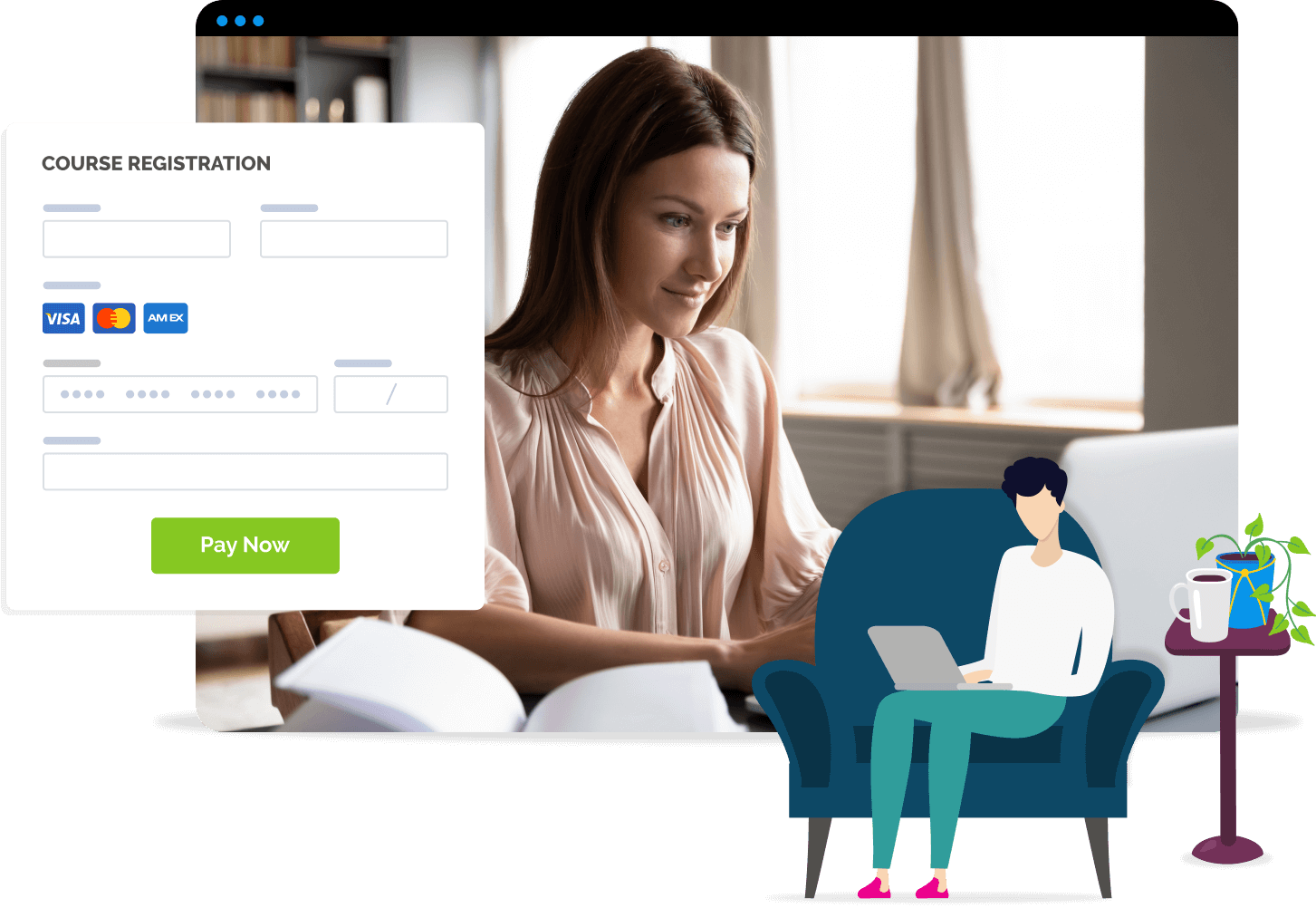
Course Registration That Gets You Paid On Time, Every Time
Increase Your Cash Flow By 35%!
An Email Announcing the Launch of Your New Course
Your first goal is to build anticipation for your new e-course. An announcement email should capture the reader’s attention and get them excited about what they can learn from you.
When writing your announcement email, keep the following tips in mind:
- Find a way to stand out. Your potential customers receive dozens, if not hundreds, of emails every day. Your email should be creative, easy to read, and have that extra flair that makes it memorable.
- Focus on the customer. Don’t talk about yourself or your company too much. Instead, speak to and about your audience’s needs. Show you understand what they’re looking for. That way, they’ll trust you when you say you have a solution.
- Don’t oversell. It’s tempting to ramp up your audience’s expectations and excitement as much as possible. But customers are savvy—they know that if something sounds too good to be true, it probably is.
Here’s a good template to get you started (but try to add your own unique flair to make the email stand out in your audience’s inbox):
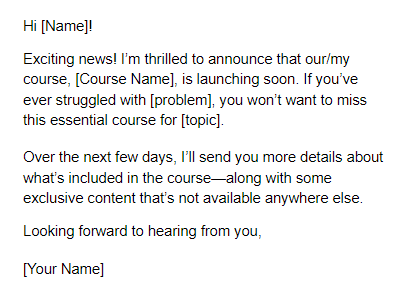
Source: Regpack
As you can see, the email is short, but still brings a dose of excitement to make the readers interested in what you’re offering, which is exactly what an announcement is supposed to do.
An Email Highlighting What the New Course Offers
Next, focus on driving home the problem your audience has and how your course will help them solve it.
This email should provide an overview of the new course: who the course is for, what topics it covers, and the curriculum.
Offering detailed information is essential to help readers realize the value of what the new course offers.
But in listing the topics you’ll cover, be sure to focus on showing you understand how the audience feels.
In other words, connect the dots between the course’s structure and how it can help your readers.
For instance, don’t just say “Email marketing tips”; instead, say “Basics of email marketing for [value]”. That way, you let them know specifically how they can benefit from what you provide.
Some new course creators try to bombard their email lists with dozens of sales-centered messages.
But be careful; instead of building anticipation, too many sales-y emails might just get the user to unsubscribe.
Instead, show your audience that you understand the problem they have and that you can help them solve it.
You may even want to include educational content that helps your audience get started solving that problem on their own.
Giving information away for free sounds like bad business sense if you’re trying to sell a course—but in fact, it’s a savvy move.
Give your audience a taste of the valuable insights you have to share with them.
They’ll think, “If they’re giving this information away for free, I can only imagine what they’ve got to offer in the paid course!”
Here’s a template to get you started.

Source: Regpack
Remember to fill in the blanks with unique, educational content to really showcase your authority and make the reader excited to keep learning from you.
An Email Announcing the Course Has Become Available
Once you’ve opened registration for your new course, send an official announcement to let your audience know they can now sign up.
Those who were already excited about the new course will take the announcement as the go-ahead to register, while those who are just finding out about it or are still undecided can be motivated to do the same.
Feel free to use this template:
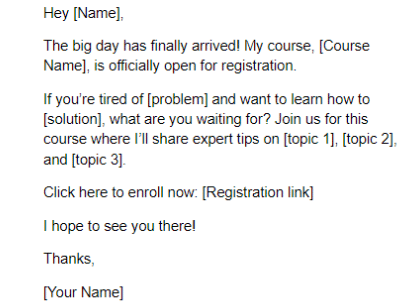
Source: Regpack
This is a simple email announcing that the course is finally available for purchase.
It’s also a good idea to toss in a quick reminder summing up the value your readers can expect to gain from the course.

Course Registration Shouldn’t Be Complex
Simplify Your Process, Raise Your Cash Flow!
An Email With a Special Offer or Limited Time Deal
As a marketer, one of your worst fears is for a customer to see something they’re interested in, and think, “I’ll buy that later.”
The longer they wait, the more likely they are to lose interest and move on to something else.
Sometimes having an incentive, like a special offer for those who sign up before a certain date, can motivate readers to take action and sign up for a new course.
Many course creators use incentives like:
- 10-20% discount on registration fees for anyone who signs up within the first few days
- A bonus for the first 50 registrants
- Limited sign-up window (“Registration closes this Friday at 11:59PM”)
- Limited registration spots open (“I only have 5 seats left!”)
We suggest trying out this template:
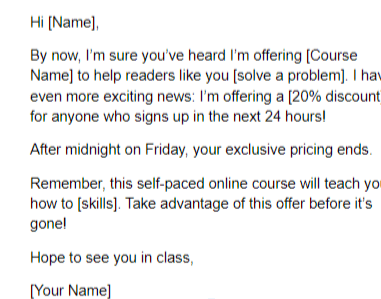
Source: Regpack
The fear of missing out on a great one-time offer can be what motivates readers to sign up.
An Email Announcing the Last Chance to Sign Up
A discount or deal can be very motivating—but so can FOMO (the fear of missing out).
Give your prospects one more dose of urgency by announcing the very last chance to snag your course before it’s gone.
Remember these tips to make your “last chance” emails as effective as possible:
- Cut to the chase. Your readers have heard from you a few times already by this point, so they already know what this email is about. Remind them quickly of the course topic, how it will benefit them, and what they’ll miss out on if they let this chance pass them by.
- Emphasize scarcity. Things like a countdown timer or a clear reminder of how many spots are left can really make a difference.
- Include social proof. If customers have already bought your course and loved it, a “last chance email” is a great place to include short testimonials.
Here’s a template to get you started:
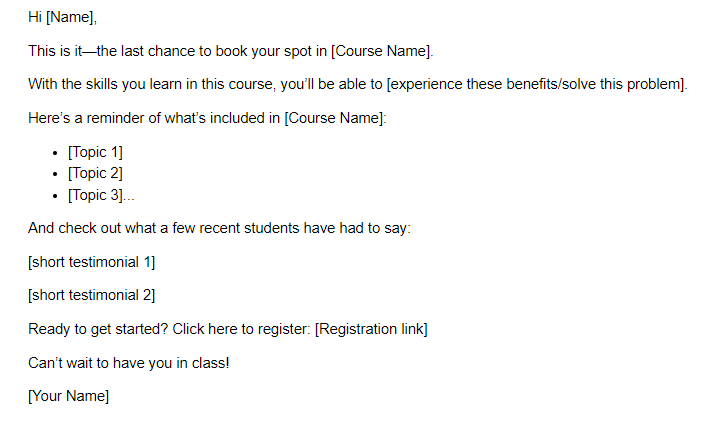
Source: Regpack
Knowing that time is running out can convince readers to take immediate action and sign up for the course.
An Email Thanking Attendees for Having Enrolled
As a marketer, your job isn’t over once the customer purchases your course.
Your next message should be a registration confirmation email that expresses gratitude to the customers for enrolling in the new course.
Your email content should put the customer’s mind at ease that they’ve made the right decision by purchasing your course.
If possible, include a video message (or a link to a video) congratulating the customer for joining your online community.
Feel free to use this template as a guiding resource:
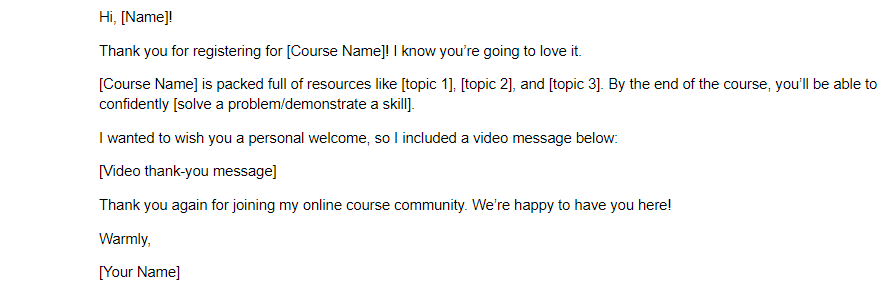
Source: Regpack
Thanking attendees helps make them feel valued and encourages them to build a stronger relationship with you.
And of course, the more positively they feel about you, the more likely they’ll be to sign up for another course.
An Email Asking Course Attendees for Feedback
Your email sequence isn’t over after customers make a purchase. Asking for feedback from customers makes them feel appreciated—and that feedback benefits you, too.
Finding out what attendees liked and disliked about the course helps you improve it, both in real-time and in future courses.
But don’t just ask for open-ended feedback. According to eLearning expert Ioana Moldovan:
The biggest enemies of good feedback are generalities and niceties. The first is the tendency to say things that are non-specific such as “great course” or “I didn’t like it” without elaborating further. The second is the fact that people will often say things that they think you want to hear.
Moldovan suggests asking attendees the three following types of questions:
- General questions about the course: why they chose it, what they enjoyed the most, and what they would change about it.
- Questions about the course content: which topics should be expanded upon and whether they skipped any sections.
- Questions about learning goals: how well they feel they can apply what they learned.
- Questions about course interaction: how well the material showed up on mobile devices and how the course schedule fit into their routine.
Here’s a template feedback request email to get you started:
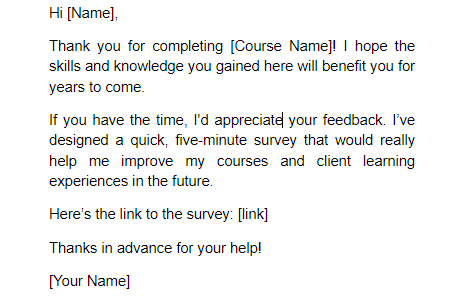
Source: Regpack
Hopefully, the feedback you receive will prove helpful, and you will be able to use it to achieve even better attendance in your next course.
Launch Your Online Course the Right Way
Email marketing is an essential step in launching your online course.
Whether you’re a solo content creator or a brand engaging in e-course marketing, the right email sequence will maximize registrations.
Use the email templates above to announce a new course, highlight its value, and remind interested applicants of important deadlines to register.

Your Courses Matter, So Does Your Cash Flow
See How Efficient Registration Affects Cash Flow!


















